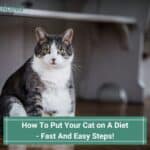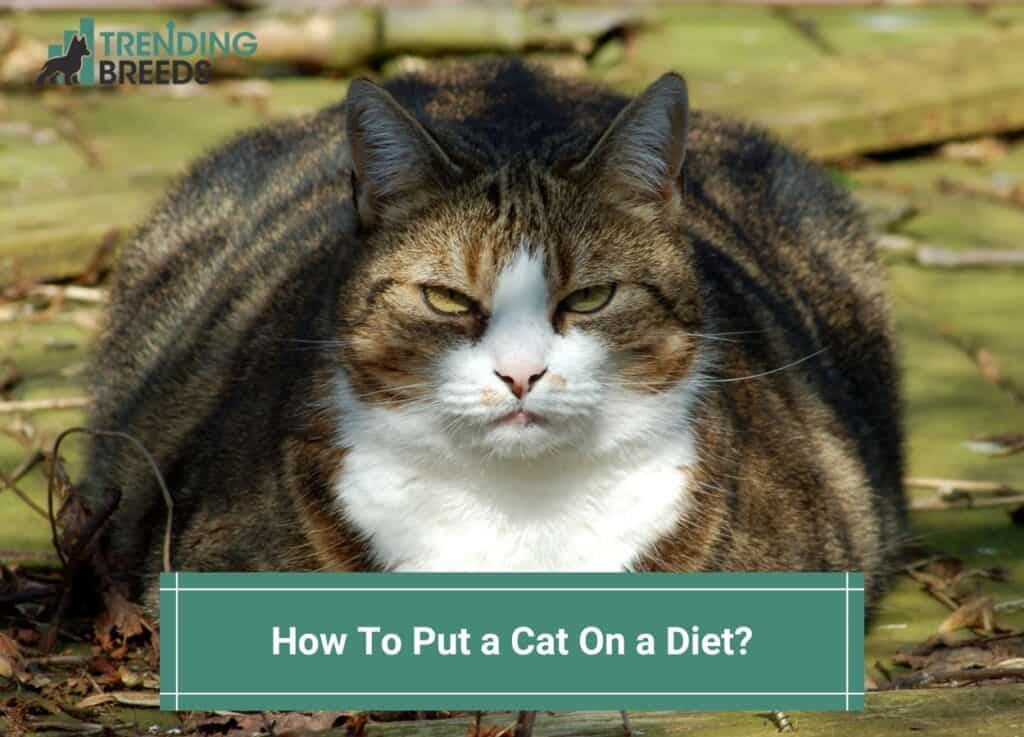
While your fluffy, chubby cat may seem adorable, obesity can be a serious problem for cats.
Cats are meant to be active and slender and if they are overweight, the extra weight can make it harder for your cat to move around and could lead to depression and other health problems.
Indoor cats are more likely to be overweight than outdoor cats, but a healthy diet is important for all cats. If your cat is overweight and you think it could be the result of overfeeding, you may need to put your cat on a diet.
There are some things to keep in mind if you choose to do so and it’s always best to consult your veterinarian before you make any changes to your cat’s diet.
Table of Contents
Other articles you would like: How To Get A Cat Out Of Heat With A Q Tip? and My Cat Is In Heat And Won’t Shut Up – What Should I Do?.
How Much Should I Feed My Cat To Lose Weight?
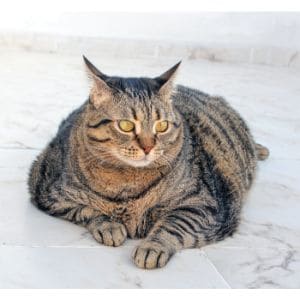
The best way to decide how much to feed your cat to help it lose weight is to consider the cat’s current weight and calorie intake. If your cat is gaining weight, it is clearly eating too much or taking in too many calories.
To help your cat lose weight, you simply need to reduce the calories. Most of the time this means reducing the portion sizes, but it can also mean changing your cat’s diet.
If your cat is consuming cat food that is high in calories but low in nutrients, reducing the serving size could make your cat sick. Instead, you will want to look at finding cat food options that are higher in nutrients and lower in calories.
If you do choose to reduce your cat’s calorie intake, consider reducing it to 80% of its current amounts.
There are a lot of things that should be taken into consideration when you are trying to figure out how many calories your cat should have each day. It’s best to discuss it with your veterinarian.
Your veterinarian will be able to tell you how many calories your cat should be consuming each day to be healthy. You can then determine how many calories your cat has been eating and compare the numbers.
Once you have determined the difference, you should reduce the amount your cat is eating by 20%, as long as that new number falls within the recommended calorie intake.
If you notice that your cat is not overeating, or isn’t eating the recommended calories and is still gaining weight, it could mean there is another health problem causing the weight gain.
How Do I Get My Indoor Cat To Lose Weight?
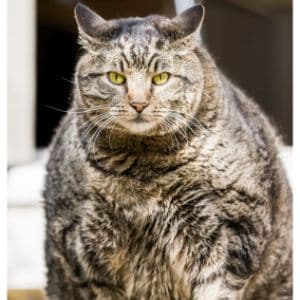
It’s often assumed that indoor cats get less exercise or are less active then outdoors cats. Outdoors cats have to work harder just to survive. They have to hunt their food, outrun predators and threats, and find shelter.
They still have time to be lazy, but since their body’s do more work, they require more calories. Indoor cats use a lot of energy too.
If you have ever watched your cat for a day, you have probably seen it climb on counters, cabinets, run through the house, chase flies, and just be overly hyper.
If your cat is on the lazy size or as it gets older, it may play less and rest more. Outdoor cats don’t have this luxury. There are some ways you can help your indoor cat lose weight.
Reduce Calories
Reducing your indoor cat’s calorie intake is one of the easiest ways to help it lose weight, but you also have to be careful not to underfeed the cat. Reduce it by a small percentage and watch for results.
Consider feeding your cat a lesser amount of a higher quality food that has plenty of nutrients to keep your cat healthy and to help it feel satisfied throughout the day so it doesn’t get as hungry.
Encourage More Play And Exercise
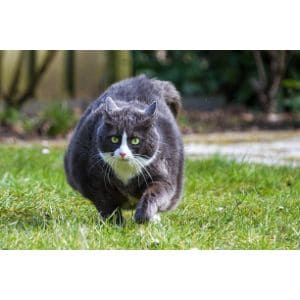
If your cat has gotten lazy, it could start gaining weight. You can help it stay healthy by encouraging it to play more often. Find ways to play with your cat so it stays interested and will be more likely to play longer.
Buy interesting toys that will allow your cat to stay stimulated. Choose things that the cat can chase, bat around, or follow. Balls, catnip-filled stuffed toys, sticks with feathers and strings, and yard are a few good options.
Anytime you can use these things with your cat, the better. Not only will it help your cat get in shape, it will allow you to bond with it.
You can also find robotic toys that move strings, sticks, or feathers so your cat will chase them. If you are gone a lot and have to leave your cat home alone to entertain itself, these can be a good option.
Keep in mind you can also take your cat on walks. While it’s not as common to see someone walking their cat as it is their dog, it’s still possible.
There are cat collars and harnesses that allow you to connect your cat to a leash so you can safely walk it around the neighborhood.
Cat trees are another good option to help your cat stay active. They encourage your cat to climb, jump, and can be placed near windows your cat can look outside.
Timed Feedings
If your cat has access to food at all times, it could simply be overeating. By using timed feedings and automatic feeding dishes, you can control how much your cat eats and how often it eats and fight obesity.
Feeding several small meals can help keep your cat metabolism going strong throughout the day. You can buy automatic feeders at most pet supply stores or you can also just feed your smaller meals throughout the day.
Healthier Options
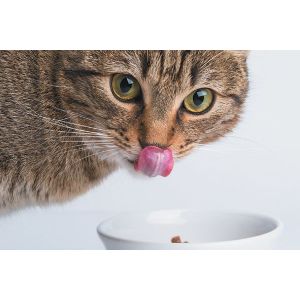
Feeding your cat foods that are lower in calories and higher in nutrients can help your cat lose weight. You can talk to your veterinarian about which foods are the best for your cat or which ones can help it lose weight.
You may need to pay more for a diet that is higher quality, but once you get your cat’s weight under control, you may be able to transition to other foods.
Frequent Health Exams
If your cat is gaining weight and you aren’t overfeeding it, it may be a sign that there is another health problem. Make sure you are taking your cat to the veterinarian for frequent checkups to ensure it is healthy.
If there are any underlying causes making your cat gain weight, your vet should be able to diagnose and treat them so your cat stays healthy.
If your cat has recently started taking new medication and has gained weight, you may want to discuss it with your veterinarian. There may be other options available that will treat their health problems without causing weight gain.
What Can I Feed My Cat To Lose Weight?
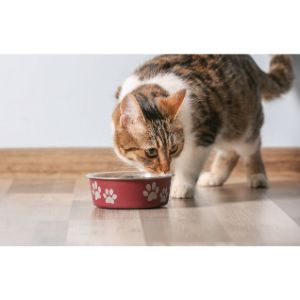
The best food to help your cat lose weight is one that is high in nutrients but low in calories.
Many veterinarians recommend soft canned foods. Not only are these foods portioned smaller, they are high in the vitamins and nutrients that cats need.
Many canned foods are also more enticing to cats as they prefer the soft texture and strong scent. Canned foods come in different flavors so your cat won’t get bored eating them.
If your cat does need some type of medication or additional vitamin supplements, it can be sprinkled on the soft food and mixed in easily.
Natural foods can also be an option. If you have time to prepare your cats food yourself, you can choose to prepare lean proteins mixed with vegetables and whole grains.
Always talk with your veterinarian before feeding any new foods to your cat to ensure it can tolerate it.
How Long Does It Take For A Cat To Lose Weight On A Diet?
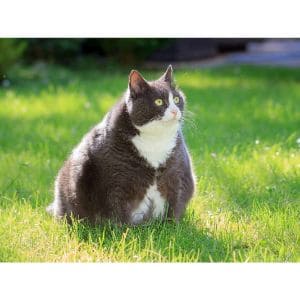
As long as your cat’s diet is still healthy and there are no underlying causes making your cat gain weight, your cat should be able to reach a healthy diet between six and nine months after starting it. Of course, this can vary by cat and the weight.
Cats that are very heavy should lose weight faster than those that are just slightly overweight. You can expect your cat to lose up to a pound a month.
If you notice your cat is losing weight too quickly, it may not be getting enough to eat or may not be getting adequate nutrients or there could be something else wrong.
Monitor your cat closely when it is dieting to make sure it is losing a healthy amount of weight and consult with your veterinarian if your cat isn’t losing enough or seems to be losing too much.
Is 1 Cup Of Cat Food Too Much?
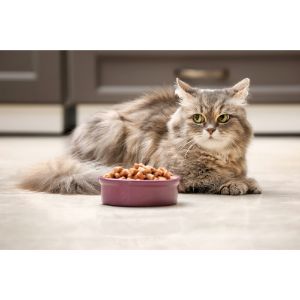
A cup of cat food is a good amount to feed a cat each day. If your cat is still hungry after eating the food, try splitting up the feeding and feed ½ a cup in the morning and another ½ cup in the evening.
If your cat is not eating all of the food in one day, you can reduce the amount you are feeding it.
If you are only feeding your cat a cup for food a day and it is still gaining weight, you might want to reduce the amount to ¾ cup and see if there are any results.
It’s possible that your cat may need more or less food, depending on their age, overall health, and activity level. If you aren’t sure if you are feeding your cat enough, talk with your veterinarian and discuss food options.
Why Do Indoor Cats Get So Fat?
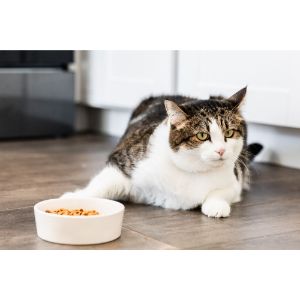
Indoor cats are more likely to be overweight than outdoor cats for several reasons. The biggest reason is that they have it made and life is easy for them. Cats were meant to be outside before they were domesticated.
They had to hunt and work hard to survive their environment. Indoor cats have their food and water brought to them, they don’t have to search for shelter, or fight off predators to protect themselves or their young.
All of these things help outdoor cats burn calories and keep them fit. Indoor cats can be lazy and will still get fed. They also have less stimulation than outdoor cats, so they are less likely to be active.
Indoor cats can become lonely, and bored if their owners are gone often, and may become depressed. This can also lead to a lack of exercise. Outdoor cats are also more likely to eat natural foods that are low in calories but high in nutritional value.
It’s the opposite for indoor cats, as they are more likely to eat dry foods or commercial foods that are meant to fill them up, but not necessarily keep them healthy. As a result, they lack energy and are more likely to lay around the house.
Indoor cats are also more likely to suffer from health problems and be medicated. Some medications can cause weight gain.
Many owners choose to spay and neuter their indoor cats, which can lead to hormone changes, depression, and an overall lack in energy, and also lead to weight gain.
You will also like:
- How To Tell If Your Rat Is Too Skinny?
- How To Find A Cane Corso Trainer?
- How To Know If Your Dog’s Spay Incision Is Healing Normally?
You can learn more about cats’ diet by watching “Cat Food 101: What, When, & How Much to Feed Your Cat” down below:

